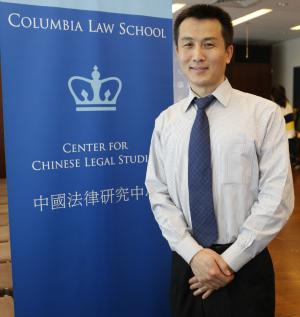Supreme Peoples Court of China Judge Speaks on Arbitral Awards
Judge Song Jianli Appears as Guest of Center for Chinese Legal Studies
New York, February 19, 2013—“The Chinese court’s efficient enforcement of foreign arbitral awards will continue into the future,” said Song Jianli, a judge on the Supreme People’s Court of China (SPC), at a presentation to Columbia Law School students on February 12.
Arbitration is an efficient, relatively inexpensive and confidential way to resolve disputes, especially in countries, like China, that have rapidly developing legal systems.
The effectiveness of foreign arbitral award enforcement began in 2000. At that time, the Chinese SPC issued a notice demanding that it be informed of all lower court refusals of foreign arbitral awards. Higher-level judges specializing in arbitration review each refusal.
The Supreme People’s Court has upheld only 24 of 64 refusals reported to them by the intermediate courts. The court remanded the other cases back to the lower courts to be enforced, Song said at his talk, titled “Recognition and Enforcement of Foreign Arbitral Awards in Chinese Courts.”
| Song Jianli |
Song, one of the youngest SPC judges, is considered a rising star in the Chinese judiciary. His responsibilities include adjudication of international civil and commercial cases and review of recognition of foreign arbitral awards.
Song explained that a foreign arbitral award is a decision rendered by an arbitration body outside China. Such a decision should not be confused with a foreign-related arbitral award, which is the decision of a Mainland Chinese arbitration body in a dispute with foreign elements.
In 1986, China ratified the New York Convention, which is applied directly in Chinese courts as domestic Chinese law. Pursuant to the New York Convention, courts only review arbitration procedure without looking into the merits of a case. There are seven grounds for non-enforcement: invalid arbitration agreement, improper composition of arbitration panel, use of improper procedure, lack of a fair opportunity to be heard, beyond the scope of arbitration agreement, arbitrability, and public policy.
The most widely used defense is known as “the escape clause.” This defense argues that enforcement of the award would be against the public policy of the enforcing country. Chinese courts tend to construe the “escape clause” narrowly. Only one award has been voided on this basis since 2000.
Song appeared at the Law School as a guest of the Center for Chinese Legal Studies, whose ongoing event series features China experts who explore important research and issues in law, economics, and human rights. Columbia Law School has been a leader in Chinese legal studies for more than 30 years, and the program’s cornerstone is the Center for Chinese Legal Studies.
